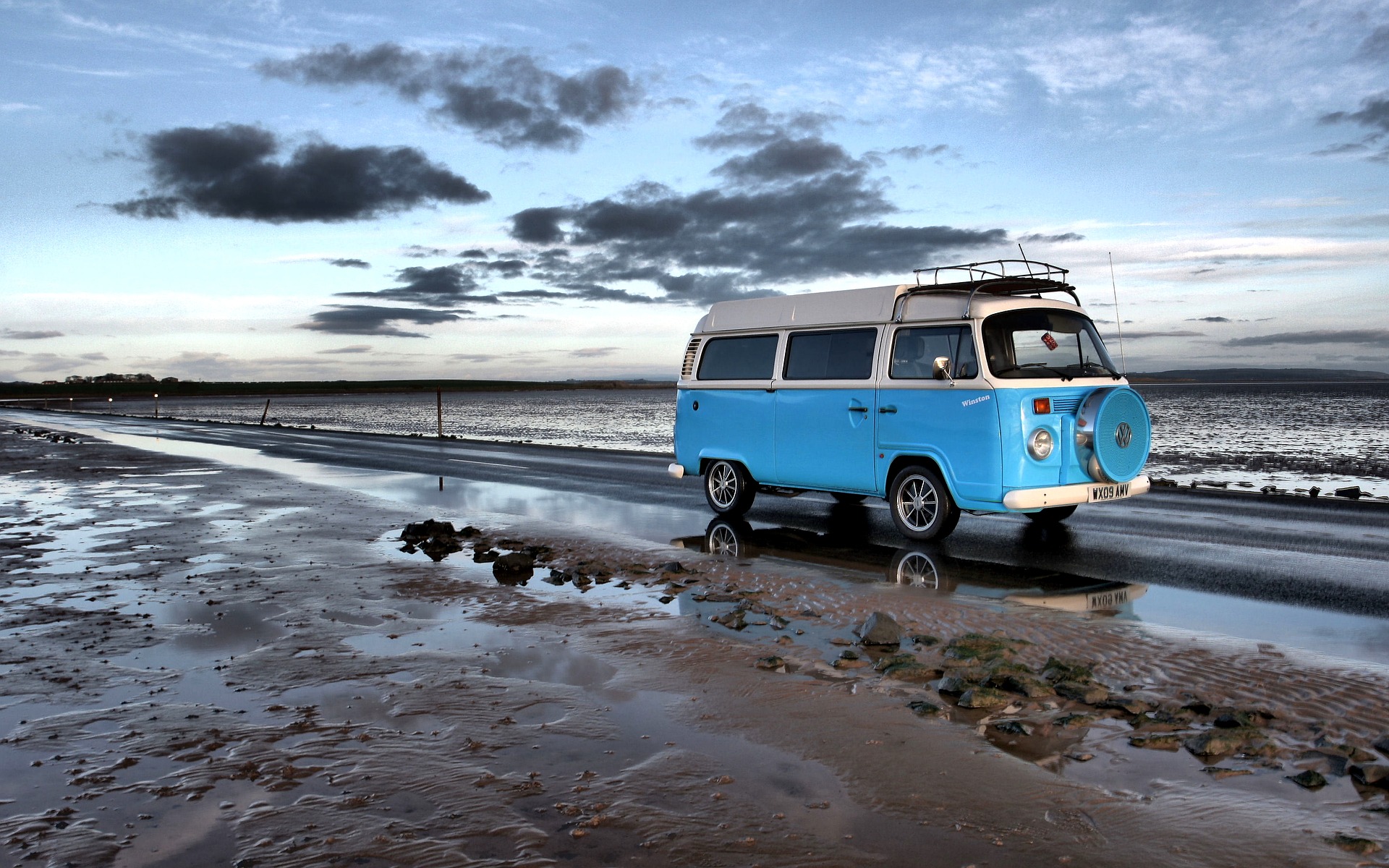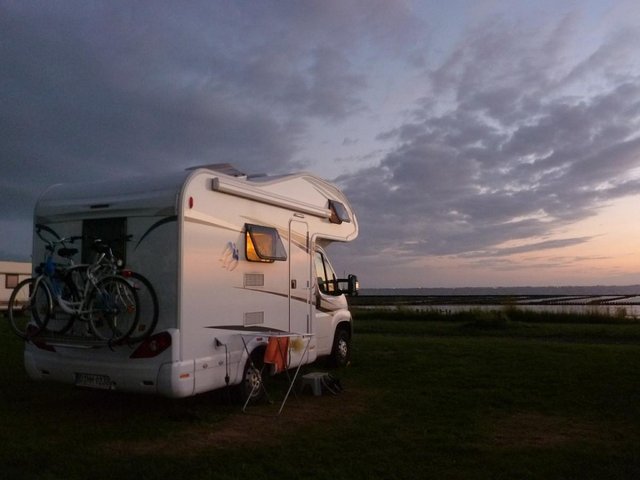If you like the idea of camping this summer but are looking for a few more home comforts than camping under canvas, why not invest in a caravan? It needn’t be expensive – there’s a plethora of second hand caravans and second hand campervans available, starting at under £500! To help you on your way, we’ve put together our top 10 tips for buying a second hand caravan or camper van.
1) Caravan or campervan?
Your first decision is choosing between a caravan or campervan. There has been many a lively debate in our camping forum about which is better, but in general it comes down to the type of holiday you are looking for.
If you are looking to spend your holidays travelling between several different camp sites, perhaps touring a wide area, then a campervan is probably the better choice. There’s little to do when arriving at each destination; you can have your feet up and be enjoying a cup of tea within minutes of arriving at your pitch.
However, caravans do offer a lower cost option and, if you expect to spend one or two weeks relaxing in the same spot, can be the better choice. The advantage here is that i it’s easy to take the car and explore places that might be too small and narrow for a large camper van.
2) Size matters
Obviously, larger caravans are able to offer a level of luxury not available in smaller vans, giving you larger berths, spacious washing facilities and generously equipped kitchens. You will also have the space to host friends and family in comfort.
The downside is that you will need a much bigger and more powerful tow car to pull these larger vans, and manoeuvring both on the road and on the camp site will be more difficult. The rule of thumb is that your caravan should be no more than 85% of the kerb weight of your vehicle, although if you are new to towing you should aim for a lower ratio than this. You should also check any maximum towing weight specified by the vehicle manufacturer. Remember as well that if a caravan is more than 2.3 metres wide, you’ll need a commercial vehicle to tow it.
An easy way to increase the living accommodation in your caravan without putting on too much weight is to add an awning.

3) Do your research
Find out as much as you can about the caravan. What will it cost to insure? Are there common problems that need to be checked? What different layouts are available? Of course, in the age of the Internet, these facts are easier to find than they used to be.
Preloved offers a readers reviews section featuring caravan reviews written by the people that know them the best – the owners themselves.
4) Check the seller
Once you’ve found a potential caravan, there are a few simple things you can do to check you are dealing with a legitimate seller.
Remember, whilst caravans purchased from a dealer will be a little more expensive, you do benefit from a certain amount of extra legal protection should there be a problem with your purchase. When calling a private seller, ask about “the caravan”. If they ask “which caravan?”, you may be dealing with a dealer that is trying to pretend otherwise, thus avoiding their legal obligations.
Make sure you are able to visit the caravan at the sellers home (or business premises if they are a dealer). This should match the address shown on the caravan’s registration document.
5) Check it over
Always inspect the van thoroughly in daylight. If you are not mechanically minded, bring along someone that is. The main things to check are:
Check for damp
One of the most important checks for a second hand caravan is for damp. Repairing damp in a van is usually expensive, and in some cases could cost more than the cost of the van. If you can smell damp inside the van, be particularly cautious. It is worth spending £15 on a damp meter from your local DIY store. Check corners, bed boxes and inside cupboards and lockers. Check the condition of the external sealing around the body and window frames by pressing close to the joint; poor sealing will soon lead to internal damp problems. Look for any external damage that might cause water ingress. Note that the floor of the van does not feel spongy underfoot.
Check the doors and windows
Check the main door to ensure the lock and hinges are secure and everything moves freely. Ensure the main door has a watertight fit all the way around. Also check the fit of any windows and roof vents; and look out for cracking or crazing in plastic windows, and internal condensation in double glazed units. Replacement of these parts is likely to be expensive on any van, and for older vans may be difficult to find.
Check the chassis and running gear
It is important to check the condition of the chassis, the hitch, and the suspension as repairs or replacement can be expensive. Look out for corrosion on the chassis and look out for signs of new paint or underseal that might be hiding something underneath. Ensure the hitch mechanism moves freely and the rubber gaiter is not split. Check the jockey wheel winds up and down easily and rotates freely. Check all the steadies wind up and down freely. Confirm the handbrake is effective and ensure the mechanism moves freely. Look to see if grease nipples appear to have been neglected.
Check the gas and electrics
Check the condition of the gas and electrical system. If in any doubt, have them checked out by a professional as faulty systems can be lethal. Look out for any signs of DIY work on these systems.

6) All the little things
Once you’ve bought your pre-owned caravan, kitting it out with all the ‘essential’ accessories can do quite a bit of damage to your wallet. However, if a van already has these items included in the sale, it is well worth paying a little extra to save future expense. Look out for leisure batteries, battery chargers, gas bottles, electric hook-ups, hitch locks, TV equipment etc. Also, having an awning included that is the right size for your caravan is particularly valuable.
7) Check the history
Find out as much as you can about the history of the van. Ideally, there should be a formal service history in the form of receipts and invoices for work. An owner with the original handbook has probably looked after the van in other ways. Ask how much the caravan has been used recently, over what kind of distances, and watch for vans that have been standing for long periods.
8) Check the age
It can sometimes be difficult to get an accurate estimate of the age of your caravan. If it is a newer van you should be able to get the age from an HPi check. However, if it’s an old van, all is not lost! Preloved is host to the UKs caravan oracle, Mark Lewis of Callender Caravans, who can usually be persuaded to tell you the age of your caravan.
9) Get an HPI check
Any caravan manufactured after 1992 will have its VIN registered on the Caravan Registration Identification Scheme (CRiS). This 17 digit VIN number (usually starting with an SG) is stamped on to the chassis and on later models etched into the windows. Preloved strongly recommends that you carry out an HPI check before parting with your money. This check will confirm the true identity of the van as well as report if it has outstanding finance, it is reported stolen, or has previously been recorded as an insurance write off.
10) Be a good buyer
Turn up on time for your viewing, make a prompt decision (after all the appropriate checks), and offer to take the caravan away promptly. If you need a loan, get it in place beforehand so you are ready to go. Offer the seller a guaranteed method of payment that both you and the seller are happy with. The best way of negotiating a good discount on the price of a caravan in perfect condition is to have the ability to move quickly.

